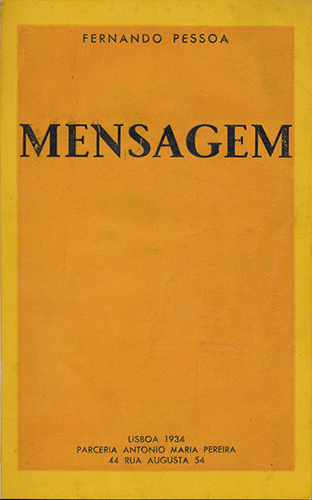
Ó mar salgado, quanto do teu sal
São lágrimas de Portugal!
Quando virás, ó Encoberto,
Sonho das eras portuguez,
Tornar-me mais que o sopro incerto
De um grande anceio que Deus fez?
O salty sea, so much of whose salt
Is Portugal’s tears!
When will you come home, O Hidden One,
Portuguese dream of every age,
To make me more than faint breath
Of an ardent, God-created yearning?
(Trans. Richard Zenith, Message)
Living in a paradoxical era of artistic experimentalism and political authoritarianism, Fernando António Nogueira Pêssoa (1888-1935) is considered Portugal’s most important modern writer. Born in Lisbon, he was a poet, writer, literary critic, translator, publisher and philosopher. Most of his creative output appeared in journals. He published just one book in his lifetime in his native language Mensagem (“Message”). In the same year this collection of 44 poems was published, António Salazar was consolidating his Estado Novo (“New State”) regime, which would subjugate the nation and its colonies in Africa for more than 40 years. Encouraged to submit Mensagem by António Ferro, a colleague with whom he previously collaborated in the literary journal Orpheu (1915), Pessoa was awarded the poetry prize sponsored by the National Office of Propaganda for the work’s “lofty sense of nationalist exhaltation.”[1]
Because of its association with the Salazar’s dictatorship, Mensagem was regarded as a national monument but also as something reprehensible. Translator Richard Zenith describes it as a “lyrical expansion on The Lusiads, Camões’ great epic celebration of the Portuguese discoveries epitomized by Vasco de Gama’s inaugural voyage to India.”[2] At the same time, it traces an intimate connection to the world at large, or rather, to various worlds (historical, psychological, imaginary, spriritual) beginning with the circumscribed existence of Pessoa as a child. Longing for the homeland, as in The Lusiads, is an undisputed theme of Pessoa’s verses as he spent most of his childhood in Durham, South Africa, with his family before returning to Portugal in 1905.
Pessoa wrote in Portuguese, English, and French and attained fame only after his death. He distinguished himself in his poetry and prose by employing what he called heteronyms, imaginary characters or alter egos written in different styles. While his three chief heteronyms were Alberto Caeiro, Ricardo Reis and Álvaro de Campos, scholars attribute more than 70 of these fictitious alter egos to Pessoa and many of these books can be encountered in library catalogs sometimes with no reference to Pessoa whatsoever. Use of identity as a flexible, dynamic construction, and his consequent rejection of traditional notions of authorship and individuality prefigure many of the concerns of postmodernism. He is widely considered one of the Portuguese language’s greatest poets and is required reading in most Portuguese literature programs.[3]
According to Ethnologue, there are over 234 million native Portuguese speakers in the world with the majority residing in Brazil.[4] Portuguese is the sixth most natively spoken language on the planet and the third most spoken European language in terms of native speakers.[5] Instruction in Portuguese language and culture has occurred primarily within the Department of Spanish & Portuguese. Since 1994, UC Berkeley’s Center for Portuguese Studies in collaboration with institutions in Portugal brings distinguished scholars to campus, sponsors conferences and workshops, develops courses, and supports research by students and faculty.
Contribution by Claude Potts
Librarian for Romance Language Collections, Doe Library
Sources consulted:
- Preface to Richard Zenith’s English translation Message. Lisboa: Oficina do Livro, 2016.
- Ibid.
- Portuguese (PORTUG) – Berkeley Academic Guide (accessed 2/4/20)
- Ethnoloque: Languages of the World (accessed 2/4/20)
- CIA World Factbook (accessed 2/4/20)
~~~~~~~~~~
Title: Mensagem
Title in English: Message
Author: Pessoa, Fernando, 1885-1935.
Imprint: Lisbon: Parceria António Maria Pereira, 1934.
Edition: 1st
Language: Portuguese
Language Family: Indo-European, Romance
Source: Biblioteca Nacional de Portugal
URL: http://purl.pt/13966
Other online editions:
- Mensagem / Fernando Pessoa. – 1934. – [70] p. ; 22,2 x 14,7 cm. From Biblioteca Nacional de Portugal (BNP), http://purl.pt/13965.
- Mensagem. 1a ed. Lisboa : Pereira, 1934.
- Mensagem. Print facsimile from original manuscript in BNP. Lisboa : Babel, 2010.
- Mensagem. Comentada por Miguel Real ; ilustrações, João Pedro Lam. Lisboa : Parsifal, 2013.
- Mensagem : e outros poemas sobre Portugal. Fernando Cabral Martins and Richard Zenith, eds. Porto, Portugal : Assírio & Alvim, 2014.
- Mensagem. Translated into English by Richard Zenith. Illustrations by Pedro Sousa Pereira. Lisboa : Oficina do Livro, 2008
The Languages of Berkeley is a dynamic online sequential exhibition celebrating the diversity of languages that have advanced research, teaching and learning at the University of California, Berkeley. It is made possible with support from the UC Berkeley Library and is co-sponsored by the Berkeley Language Center (BLC).
Follow The Languages of Berkeley!
Subscribe by email
Contact/Feedback
ucblib.link/languages
![The Languages of Berkeley [fan]](https://update.lib.berkeley.edu/wp-content/uploads/2019/02/fan_languages-450px.jpg)